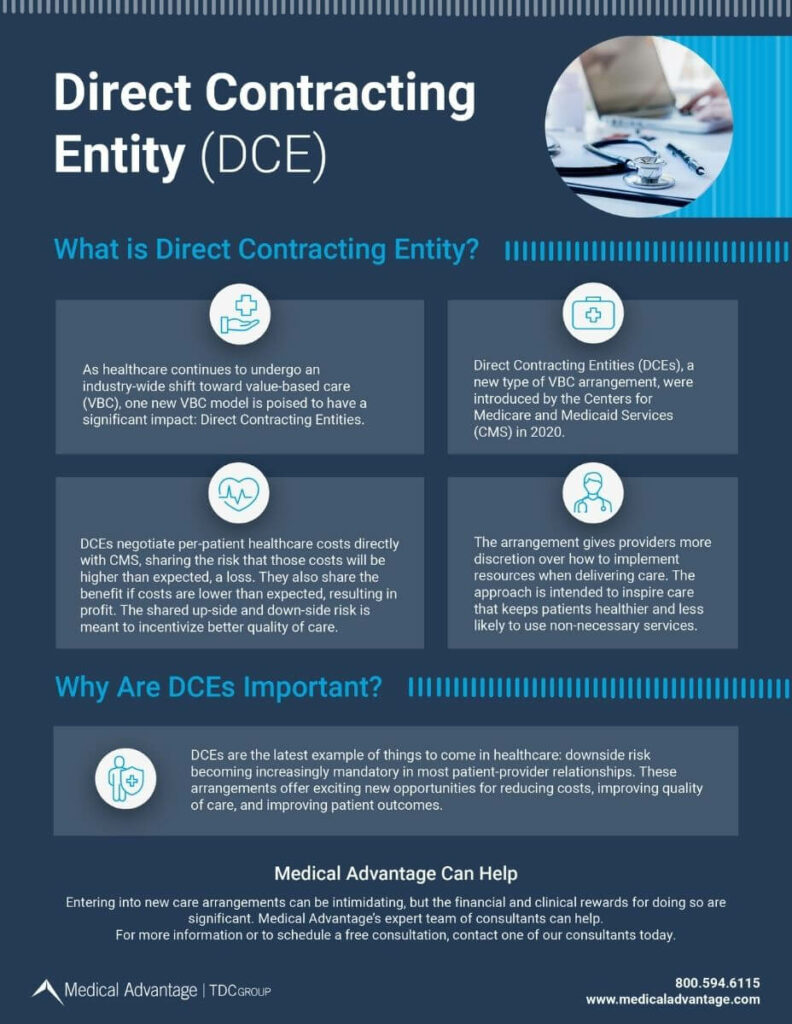As healthcare continues to undergo an industry-wide shift away from fee-for-service toward value-based care, payers, providers, and patients alike find themselves with more care options than ever before. During this ongoing realignment of the healthcare marketplace, a relatively new value-based care model is poised to have a significant impact on the future of primary care delivery: Direct Contracting Entities, or DCEs for short.
What is a Direct Contracting Entity
Direct Contracting is a voluntary alternative payment model that spans five years (offering the option of an implementation year). Components of Next Generation ACO (Accountable Care Organization) Model (NGACO), Medicare Advantage (MA), and the private sector all play a role in direct contracting. The ultimate goal is to drive costs down while improving patient outcomes.
How Direct Contracting Works
DCEs negotiate capitated (per-patient) health care costs directly with CMS, sharing the risk that those costs will be higher than expected, resulting in a loss. They also share the benefit if the capitated cost turns out lower than expected. The shared up-side and down-side risks are meant to incentivize better quality care. The approach is intended to inspire care that keeps patients healthier and less likely to require unnecessary, or preventable, services.
Here’s how it works:
- The Direct Contracting Entity receives funding from CMS up front. The amount provided depends on the number of Medicare lives under its care. These funds are used to manage patient care while incentivizing and rewarding physicians in the DCE.
- Like other CMS payment models, DCEs have both upside and downside risk. However, DCEs share those peaks and valleys, allowing them to realize a significant part of savings in a well-managed system. Currently, DCEs can opt to share either 50 percent or 100 percent of the savings. That choice also applies to cost overruns. While the risk of loss is significant, the opportunity to receive higher reimbursements than in other programs (such as a Medicare ACO) is compelling.
Direct contracting is a novel approach to VBC (Value-Based Care) that offers providers more discretion over how best to allocate resources for care delivery. This model carefully coordinates care among providers (primary care, specialists, lab and diagnostic testing), promoting more effective care. “We’ve been historically spending money in fee-for-service in a way that may not reflect what is in the best interest of the patient. The Direct Contracting Entity model serves to empower the providers who know their patients the best, to take that pool of resources and reallocate it to achieve a more appropriate care plan for those individuals,” said Aneesh Chopra, President of CareJourney and former U.S. Chief Technology Officer under President Barack Obama. “That might mean more investments in social services and supports, financial assistance, maybe even care management resources that are not typically paid for under traditional fee-for-service medicine.”
Healthcare Trends over the Next Decade
Healthcare is an industry in flux, and the sea changes the sector is currently experiencing are likely to only accelerate in the coming years.
The rising emphasis on value-based care is no coincidence: in 2019 (the most recent year with complete 12-month statistics) healthcare costs comprised nearly 18 percent of U.S. gross domestic product (GDP). CMS projects that by 2028, healthcare spending will reach $6.2 trillion—almost 20 percent of GDP. Despite this rising price tag, Americans will not be afforded better health outcomes, according to research sponsored by the Peter G. Peterson Foundation.
One of the largest drivers of these trends is fragmentation in healthcare. As the name suggests, fragmentation refers to the uncoordinated and disconnected nature that has been a hallmark of fee-for-service systems.
Value-based care models will play a pivotal role in resolving fragmentation and other issues. By increasing cooperation and consolidation in care, VBC models aim to combat wasteful spending and inefficient practices while delivering Americans higher quality care. Such is the case with DCEs that allow providers to share in more downside risk.
For providers, this means that the stakes are high – and will only get higher. With so much competition and capital filling the market, and the introduction of models like DCEs evolving to provide for these needs, it is in the best interest of providers to act sooner rather than later to avoid being left behind.
As the industry gradually moves toward downside risk being a mainstay in most patient-provider relationships, providers must figure out who their preferred network partners are, and how they can work together to be successful.
For more insights regarding trends in healthcare and predictions about the future of the industry by 2032, The Doctors Company’s in-depth white paper can be found here.
What The Benefits of DCEs Are for Medical Practices
DCEs and other value-based care models are a sign of things to come for healthcare reimbursement. The more CMS adopts these models, commercial payers will continue to follow – meaning now is an opportune time for organizations to “test the waters” and begin to acclimate themselves while the stakes are still relatively low.
An important aspect to consider before adopting a direct contracting model is the historical performance of the organization, along with population health data. This reporting is critical in order to identify challenges across the group, as well as any individual providers needing assistance. Assessing the willingness of DCE members to embrace change is important as well. Building an effective VBC network requires DCE members with a cooperative spirit to adapt and evolve; success in these models is a long-term effort.

Medical Advantage Can Help
Long-term success in any Value-Based Care arrangement requires effective patient care – measured through quality and cost metrics, as well as year over year improvement.
Medical Advantage’s expert consultants can help. Our dedicated team works side-by-side with large practices, physician groups, private equity, healthcare systems, and other stakeholders to improve outcomes amid the implementation of alternative care models. In addition, our organization is willing to cover our client’s downside risk burden to ease the transition process.
For more information or to schedule a free consultation, contact one of our consultants today.





